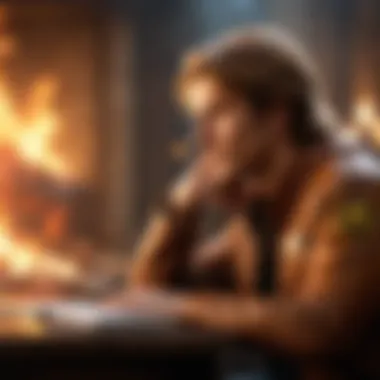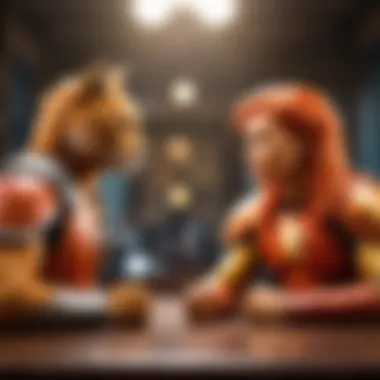Exploring Firestar and OneStar: Leadership in Warriors


Intro
The Warriors series, created by Erin Hunter, has captivated many readers with its intricate world and complex characters. Within this universe, Firestar and OneStar stand out as significant figures, each embodying their unique leadership qualities and moral dilemmas. Understanding their characters requires an exploration of their backgrounds, trials, and the effects their decisions have on their clans and the overall narrative.
This analysis aims to unravel the layers of these two leaders, who represent contrasting ideals and challenges in the world of Warriors. By diving deep into their personalities, leadership styles, and relationships with other characters, we can gain insight into the themes of morality and leadership that permeate the series.
Key Themes in Firestar and OneStar's Characters
Contrasting Leadership Styles
Firestar, originally a kittypet, rises to become the leader of ThunderClan. His journey reflects steadfast courage, a willingness to learn, and a deep sense of duty. He demonstrates empathy towards others and often faces challenges with a moral compass that prioritizes the well-being of his clan and the harmony within it.
On the other hand, OneStar, as the leader of WindClan, showcases a different perspective on leadership. OneStar often struggles with the weight of his responsibilities, at times leading with a harshness that stems from fear and insecurity. His decisions frequently challenge the balance between aggression and peace.
Moral Dilemmas
Both characters face pivotal moments that test their ethical beliefs. Firestar’s journey includes battles that require him to choose between personal loyalty and the welfare of the greater group. He learns that sometimes, the right decision is not the most popular one. Similarly, OneStar's decisions often involve sacrificing personal values for the sake of his clan’s survival.
"Every leader must grapple with choices that will define their legacy, challenging their principles in the name of their clan's greater good."
Analysis of Their Relationships
The relationships Firestar and OneStar cultivate are also crucial in shaping their narratives. Firestar’s bond with his friends, like Sandstorm and his mentor, Bluestar, reflects collaborative leadership and mutual respect. In contrast, OneStar often finds himself at odds with his clan members due to his rigid approach, leading to tensions that impact WindClan's cohesiveness.
Impact on Their Clans
Firestar's compassionate leadership inspires loyalty and fosters unity, uplifting ThunderClan in challenging times. His progressive approach often leads the clan to adapt to changing circumstances. Meanwhile, OneStar’s more traditional and at times harsh rule creates division and conflict within WindClan, making it difficult for his clan to unite under a shared vision.
End
Firestar and OneStar’s narratives exemplify the complexities of leadership within the Warriors universe. Their distinct approaches not only affect their clans but also resonate with readers on a deeper level, prompting reflection on the nature of morality, leadership, and community. The analysis of these characters sheds light on the broader implications of their journeys and offers valuable insights for fans and scholars alike.
As we continue to explore the intricacies of these characters, we can further appreciate their roles in shaping the Warriors storyline and discuss their lasting impact on the fandom.
Preamble to Warriors Series
The Warriors series stands as a unique phenomenon in literature, captivating audiences with its intricate storytelling and dynamic character development. To understand the significance of characters like OneStar and Firestar, it is essential to grasp the broader context of the series. The franchise is not just about clans of cats; it presents deep themes of leadership, loyalty, and morality that resonate with readers of all ages.
Overview of the Franchise
Launched in 2003 by Erin Hunter, the Warriors series comprises several sub-series, each delving into the lives of various cat clans. At its core, the franchise is built around the conflicts and alliances among these clans. Each book weaves a narrative that explores the struggles of survival and the moral choices characters must make. The intricate world — complete with its own lore, hierarchy, and social structures — invites readers to immerse themselves fully in the lives of the characters.
The series has expanded to include manga, guides, and spin-off series. Each installment contributes to the rich tapestry that defines Warriors, adding layers to its world while examining themes that challenge the morals of its characters. Understanding this expansive universe is crucial, as it sets the stage for analyzing pivotal characters like Firestar and OneStar. Their stories are intertwined with the central narratives of sacrifice, loyalty, and the quest for peace among rival factions.
Key Themes in Warriors
The Warriors series is steeped in themes that are both universal and profound. Primarily, it grapples with the notions of honor, courage, and the complexities of leadership. Readers witness characters facing dilemmas that test their morals and challenge their beliefs.


- Leadership: What constitutes a good leader? Characters often struggle with the weight of their decisions, balanced against the welfare of their clan.
- Morality: Ethical questions arise frequently, pushing characters to define their limits and principles.
- Community and Identity: The relationships between clans reflect societal dynamics, illustrating how community can both support and divide.
Through these themes, Warriors engages with deeper narratives regarding personal growth and the collective responsibility of leaders. It does more than entertain; it encourages readers to reflect on their values and the impact of their choices.
One of the most compelling aspects of Warriors is its ability to prompt discussions about integrity, loyalty, and the moral implications of leadership among its dedicated readers.
In summary, grasping the essence of the Warriors series is fundamental for an in-depth analysis of characters such as OneStar and Firestar. Their journeys embody the complexities of leadership in a world where every action can hold significant consequences.
Character Analysis of OneStar
OneStar, a prominent figure in the Warriors series, serves as a focal point for understanding the intricacies of leadership and morality within a clan-based society. This analysis will unpack the layers of OneStar's character, providing insights into his origins, leadership qualities, and relationships within his clan. Through this examination, readers will recognize how OneStar's journey influences the dynamics of his clan and the larger narrative of the series.
Background and Origin
OneStar's story begins as he rises from an ordinary background to become a pivotal leader in his clan. His early life is marked by challenges that shape his character. He is known for his resilience and determination. OneStar's path to leadership is neither straightforward nor devoid of obstacles. He faces prejudice due to his history, which adds depth to his character. Understanding his origin is essential for grasping the complexities he deals with while leading.
Key Points of Interest:
- OneStar's early experiences influence his leadership skills.
- His struggle against biases forms a significant part of his identity.
- The evolution from his past to leader demonstrates adaptability and growth.
Leadership Qualities
OneStar embodies a unique approach to leadership that deviates from traditional norms in his clan. His leadership is characterized by a blend of firmness and empathy. He is a strategic thinker, often weighing the consequences of his decisions carefully. OneStar does not seek power for its own sake; instead, he feels a profound sense of duty toward his clan.
Some of the notable qualities of OneStar include:
- Vision: He sets clear goals and ensures that his clan works towards them cohesively.
- Integrity: OneStar maintains high ethical standards, even when faced with difficult decisions.
- Decisiveness: He takes action when necessary, ensuring that his clan remains resilient during crises.
OneStar's ability to inspire loyalty is also noteworthy. He articulates a vision that resonates with his clan members, fostering a sense of unity.
Relationships within the Clan
OneStar's relationships within the clan serve as a crucial element of his leadership style. He cultivates strong bonds with his clan members, earning their respect and trust. These relationships affect not only his decision-making but also the overall morale of the clan.
- Mentorship: OneStar takes the time to mentor younger members, preparing the next generation for leadership roles.
- Conflict Resolution: He approaches conflicts with a level head, often seeking collaborative solutions.
- Support Systems: His supportive nature helps create a nurturing environment within the clan.
In summary, the character analysis of OneStar highlights the critical aspects of his background, leadership qualities, and interpersonal relationships. This understanding enriches the overall narrative of the Warriors series and illustrates the importance of character depth in storytelling. OneStar's complexities enhance the readers' engagement, and his journey serves as a mirror reflecting broader themes of leadership and moral responsibility within the series.
Character Analysis of Firestar
Background and Origin
Firestar's story begins when he is introduced as a young house cat named Rusty. He is curious and eager to explore the woods surrounding his home. His life dramatically changes when he encounters ThunderClan, one of the four warrior clans. The decision to leave the comfort of domestic life and join the clan serves as the first significant turning point in his journey. This choice to embrace a new identity highlights the significance of finding one's place in the world, a theme that resonates throughout the Warriors series.
As Firestar integrates into ThunderClan, he faces both acceptance and skepticism. His beginnings as a non-wild cat often serve as a point of conflict. He is frequently reminded of his origins and struggles to prove his worth. This dynamic is crucial as it showcases his resilience and determination. He becomes a symbol of growth, not just for himself, but also for others who might feel out of place.
Hero's Journey and Key Decisions
Firestar's journey embodies a classic hero's narrative. His ascent within ThunderClan leads him to significant trials and decisions that test his character. From the moment he becomes an apprentice, he is thrust into the realities of clan life, which is full of dangers and moral complexities.


One of the most pivotal moments occurs when Firestar learns about the prophecy regarding the forest's future. He must choose between personal safety and the safety of the clan. This decision not only highlights his bravery but also underlines his growth as a leader. He consistently puts his love for his clan above personal ambitions. His choices often reflect a deep understanding of the responsibilities that accompany leadership.
Moreover, his relationship with other characters, such as Sandstorm and Graystripe, also shapes his decisions. The alliances he forms often circle back to influence consequential outcomes in the storyline.
Influence on Other Characters
Firestar's role is not limited to his own story; rather, he is a catalyst for change in those around him. His character influences various clan members, especially younger apprentices. Characters like Brambleclaw and Squirrelflight look up to him as a mentor and guide. He provides them with the tools to navigate their own struggles and challenges.
Additionally, Firestar's moral compass also creates ripples in the narrative. He demonstrates the importance of integrity and honor, encouraging others to embody these traits. His relationships often serve as lessons in loyalty and sacrifice, particularly when he confronts foes like Tigerstar.
In essence, Firestar embodies the virtues of leadership, bravery, and compassion. He impacts not only his clanmates but also the broader community of cats in the forest.
"Firestar's journey emphasizes the complexity of leadership, where decisions often come with moral implications."
Overall, Firestar's character analysis is vital in understanding his role as a heroine in the series. His backstory, key decisions, and influence on others illustrate the intricate web of character development within the Warriors universe.
Comparative Analysis of OneStar and Firestar
Understanding the comparative analysis of OneStar and Firestar is crucial for grasping their unique contributions to the Warriors series. Both characters emerge as pivotal figures, each embodying distinct leadership philosophies and moral frameworks that resonate throughout the narrative. Their contrasting approaches offer a deeper insight into the themes of power, responsibility, and the intricacies of leadership in a clan-based society. Analyzing these aspects leads to a richer appreciation of their influence on the storyline and the wider Warriors community.
Leadership Approaches
OneStar and Firestar exemplify different styles of leadership that reflect their characters and experiences. OneStar tends to exhibit a more authoritarian style, often prioritizing order and tradition. His leadership is rooted in the values of his clan, and he upholds a strict adherence to the warrior code. This perspective facilitates consistency within his clan, but can sometimes inhibit flexibility in decision-making.
In contrast, Firestar’s leadership is characterized by inclusivity and empathy. He often considers the perspectives of others, fostering a sense of teamwork among clan members. This approach allows him to navigate challenges effectively and encourages open dialogue, which can lead to innovative solutions. The differences between OneStar's and Firestar’s leadership styles highlight how personal values shape leadership choices in complex social environments.
Moral Dilemmas Faced
Both leaders confront significant moral dilemmas that test their values and principles. OneStar faces challenges related to loyalty and tradition. His decisions often reflect a struggle between adhering to clan norms and making choices that may benefit the greater good. This tension illustrates a recurring theme of duty versus morality in leadership.
On the other hand, Firestar frequently grapples with issues of trust and sacrifice. His willingness to forge alliances, even with former enemies, speaks to his moral complexity. Firestar's decisions often prioritize the well-being of his clan over rigid adherence to tradition. These dilemmas underscore the intricate nature of leadership, as both characters navigate the consequences of their choices in significant ways.
Impact on Their Clans
The leadership styles and moral decisions of OneStar and Firestar have profound effects on their respective clans. OneStar’s authoritative approach often leads to a strong sense of discipline within his ranks. While this can maintain order, it sometimes stifles individuality and innovation. His clan members may feel bound by tradition, which could deter progressive thought.
In contrast, Firestar’s influence promotes a culture of collaboration and adaptability. By encouraging clan members to express their thoughts and feelings, he cultivates resilience in the face of adversity. This environment not only fosters loyalty but also enhances problem-solving skills amongst clan members. The differing impacts of OneStar and Firestar’s leadership styles on their clans provide a compelling commentary on the effectiveness of various leadership approaches.
"Leadership is not just about authority. It is about inspiring others to achieve common goals while navigating the moral complexities that arise."
This comparative analysis highlights that although OneStar and Firestar emerge from similar backgrounds, their paths diverge significantly due to their approaches to leadership and the moral dilemmas they face. Their legacies serve as a foundation for understanding the broader themes of leadership within the Warriors series.
Thematic Elements: Leadership and Morality
The themes of leadership and morality are central to understanding the narratives of OneStar and Firestar in the Warriors series. These concepts shape their characters and influence their interactions with others. Exploring these elements reveals how each character responds to challenges and what they value while leading their clans. Analyzing leadership also provides insights into personal choices made by characters in complex situations.
Ultimately, the examination of leadership styles and the moral dilemmas faced helps in understanding broader implications within the story. These implications extend beyond their individual journeys and into the framework of the entire series. It invites readers to reflect on the nature of authority and the ethical responsibilities of a leader.


The Concept of Honor in Leadership
Honor is a significant aspect of leadership in the Warriors series. OneStar and Firestar embody different interpretations of what it means to lead with honor. Firestar’s journey begins in a position where he must prove himself among established leaders. He often receives guidance from mentors who instill the values of loyalty, bravery, and trustworthiness in him. He strives to uphold these values, aiming to serve not only the clan but also the wider community.
In contrast, OneStar approaches leadership with a sense of tradition that at times can be rigid. His dedication to following the clan's code often places him in challenging positions. He faces the question of whether tradition outweighs personal connections and growth. This divergence highlights a key conflict in the narrative—balancing honor with adaptability.
Consequences of Leadership Decisions
Leadership decisions carry weighty consequences that shape the lives of characters within the Warriors universe. Both Firestar and OneStar confront pivotal moments that force them to make choices aligning with their values, even if the outcomes are uncertain.
For Firestar, decisions often involve weighing the greater good against personal feelings. When he chooses to ally with different clans, it reflects his belief in a cooperative approach to leadership, fostering unity. Conversely, for OneStar, the consequences of his decisions tend to showcase difficulties arising from inflexibility. His struggle to balance clan loyalty with individual relationships often leads to tension among his followers.
Critically, these consequences extend to the clans they lead. Members must navigate the aftermath of their leaders' choices, often influencing their experiences and loyalty. This layer adds depth to the premise, showing that leadership is not just about one individual; it involves a collective dynamic that affects many lives.
Ultimately, the exploration of leadership and morality provides a roadmap for understanding the evolving complexities in the Warriors series. Readers learn that the road of leadership is fraught with difficult choices, and the honor of decisions is in their impact on the community.
Fandom and Community Interpretations
In the complex world of the Warriors series, the fandom and community interpretations surrounding the characters OneStar and Firestar play a critical role in expanding the narrative. Fans engage with these characters on a personal level, influencing how their stories are perceived and understood. This section explores the significance of fan theories and the impact of fan fiction on the characters' development and broader themes within the series.
Fan Theories Regarding OneStar and Firestar
Fan theories often bring depth to characters, interpreting their decisions and journeys in ways that the original text may not fully explore. For instance, some fans analyze OneStar's leadership choices by suggesting he might be shaped by past traumas not overtly presented in the series. They discuss how the struggles he faces could theortically be reflections of his insecurities, and how this affects his interactions with others.
In contrast, theories about Firestar often highlight his role as a bridge between different clans. Fans posit that his character embodies the theme of unity and peace amidst conflict. This perspective is intriguing as it emphasizes the potential for understanding and collaboration—qualities that are essential for long-term survival among the clans. Fan discussions on platforms like Reddit or Facebook can often elevate these theories, fostering a rich environment for debate and shared insights about characters.
The Role of Fan Fiction in Character Development
Fan fiction serves as a medium for fans to express their interpretations of characters like OneStar and Firestar. This genre allows for alternative storylines, delving into unexplored aspects of these characters. Through fan fiction, writers often enrich OneStar’s backstory, exploring his rise to leadership and the conflicts he endures, which adds layers to his character beyond what is seen in the series.
Similarly, Firestar is often depicted in scenarios that stress his relationships and moral dilemmas, showcasing his internal struggles and vulnerabilities not covered in the original text. Such narratives can provide insights into how fans view his character growth and his impact on his clan.
By creating stories that align or diverge from the source material, fans stimulate conversations about leadership, morality, and responsibility—a reflection of the significant themes throughout the series. Discussions around these fan fictions contribute to an understanding of the character complexities, engaging both readers and writers in meaningful dialogue that transcends simple enjoyment of the books.
These interpretations affirm the vibrant and thoughtful nature of the community engaged in the Warriors series. They not only enhance the experience of the stories but also extend the life of the narratives, allowing OneStar and Firestar to evolve in the eyes of their audience.
The End: Legacy of OneStar and Firestar
The legacy of OneStar and Firestar is significant within the Warriors series. These two characters embody contrasting leadership styles and ethical complexities that resonate deeply with fans. Their narratives offer valuable insights into the nature of leadership, the dilemmas faced by those in power, and the importance of personal integrity. Understanding their legacies helps appreciate the overarching themes of the series, making the analysis of their stories a profound experience for readers.
Enduring Impact on the Series
OneStar and Firestar's influence extends beyond their story arcs. Through their leadership, they shape the dynamics of their clans and affect the lives of countless characters. Firestar represents the classic hero, willing to make sacrifices for the greater good. His journey from a house cat to a fierce leader illustrates the importance of growth and determination. On the other hand, OneStar highlights the complexities and challenges of leadership, often leading through fear or desperation. His decisions affect the WindClan profoundly, sometimes resulting in strife and conflict.
From fans' perspectives, both characters have become symbols of diverse leadership philosophies. Firestar's bravery often inspires readers while OneStar’s struggles serve as a cautionary tale about the costs of ambition and rigid adherence to tradition. This distinction encourages discussions about effective leadership models in broader contexts, enriching the reader's engagement with the narrative.
Reflections on Leadership and Character Complexity
The journeys of OneStar and Firestar inspire endless discussions about the essence of leadership and moral choices. Firestar's character complexity emerges from his ability to empathize and unite various factions within the clans, emphasizing collaboration. His adaptability stands in stark contrast to OneStar's often rigid strategies, raising questions about the efficacy of different approaches in leadership.
Readers examine how circumstances can shape character decisions. Firestar often chooses affection and understanding, while OneStar's tough exterior leads to controversial decisions. This depiction of leadership dilemmas emphasizes the nuance in characters and illustrates their shared experiences, despite being portrayed as opposites.
"The analysis of OneStar and Firestar reveals that leadership is neither straightforward nor one-dimensional. It is shaped by choice, consequence, and situations beyond one's control."
In summary, both characters provide fertile ground for learning about leadership dynamics, moral complexity, and the implications of choice. Their legacies are not merely personal; they resonate within the fabric of the Warriors universe, influencing generations of readers and fueling discussions about the qualities that make a leader effective.



